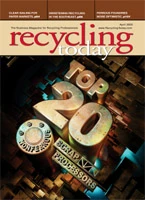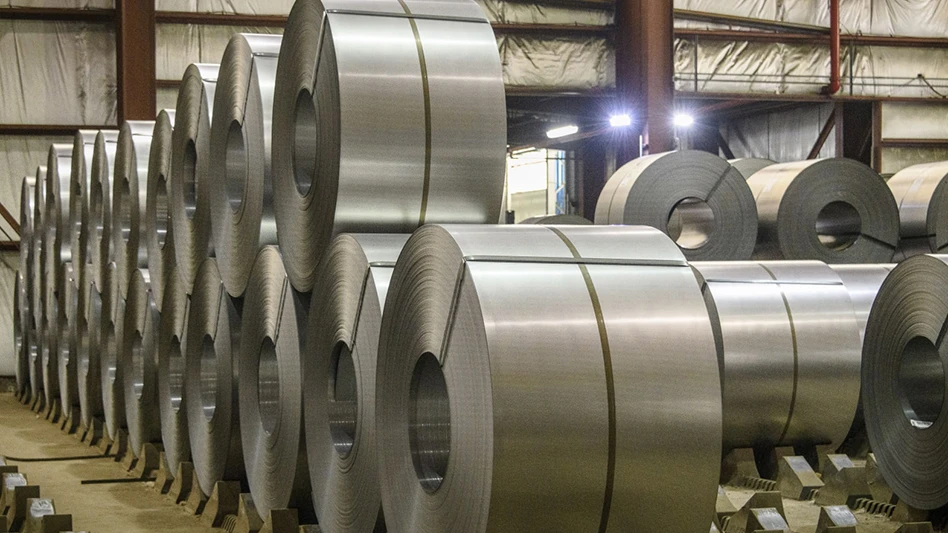PREMIER HELPS HOSPITALS MANAGE COMPUTER ASSETS
Premier Inc., based in Charlotte, N.C., has launched a comprehensive Web-based resource to assist healthcare organizations in the selection, recycling and disposal of computers and electronics.
Premier’s new Computers and Electronics in Healthcare Web site presents a number of specific purchasing strategies, including contractual guidelines for minimal toxicity of materials, as well as vendor programs for take-back, leasing and upgrades.
"Premier recognizes the potential negative impact that computers and electronics have on the environment and public health," James Fosmoe, director of Premier Group Purchasing’s Information Technology Services, says. "Premier will be using these guidelines for the selection of hardware manufacturers that provide computers and electronics to our members."
Premier’s Safety Institute produced the Web-based resource with assistance and support from Health Care Without Harm and the Computer Take Back Campaign.
Charlotte Brody, purchasing workgroup coordinator for Health Care Without Harm, called the resource a natural extension of healthcare’s purpose. "By adopting these purchasing guidelines, Premier is helping hospitals to fulfill their mission—protecting public health," Brody says.
The Web site www.premierinc.com/safety/resources/computers includes a wide range of resources on computers and electronics, such as a downloadable 10-step guide from Hospitals for a Healthy Environment that provides information on managing electronic products by keeping health, safety and compliance as priorities and a list of environmentally preferable procurement guidelines for IT equipment in health care, prepared by the Computer Take Back Campaign and Health Care Without Harm.
Premier Inc. is a strategic alliance in U.S. healthcare, entirely owned by 200 of the nation’s leading hospital and health care systems. These systems operate or are affiliated with approximately 1,500 hospitals in 50 states and hundreds of other care sites. Premier provides resources supporting health services delivery in the key areas of supply chain improvement and group purchasing, comparative data and benchmarking and insurance.
SIMS, COLLEX TO BOOST E- RECYCLING IN AUSTRALIA
Sims Group Ltd. and environmental services business Collex Pty Ltd. will introduce what they are calling the first computer and electronics recycling initiative in Australia.
The program will establish an e-scrap recycling network throughout the country, resulting in the recovery of metals, circuit boards plastics and CRT glass, according to a press release from Sims Group.
Jeremy Sutcliffe, managing director for Sims Group, says, "Australia is facing an avalanche of obsolete electronic equipment which has to be recycled, and Sims will bring its recycling expertise from its operations in Europe and the United States to apply to this business in Australia."
Doug Dean, managing director of Collex, says the initiative fits well with its resource recovery strategy. "Collex is pleased to form the recycling alliance with Sims. Diverting this material from landfill will lead to improved landfill quality across Australia and ultimately reduce the demands for raw material consumption."
Coinciding with the launch of the e-scrap initiative, Sims and Collex provided free drop-off collections for electronic equipment at various locations March 6.
In October of 2004, Sims acquired one of Europe’s largest electronic and IT equipment recyclers, giving it a spread of operations in several European countries, as well as access to the latest electronics recycling techniques.
Demand for Flat Panel, CRT Material to grow
World demand for material used in flat-panel and cathode-ray-tube (CRT) displays is expected to grow 12 percent per year through 2008, reaching nearly $22 billion, according to a recent survey by Cleveland-based research firm the Freedonia Group.
Glass is expected to remain the single largest material component, although chemicals, coatings and films will significantly increase their overall market presence, the study predicts.
The full study is available for purchase through the Freedonia Group by visiting www.freedoniagroup.com.
eBAY LAUNCHES PC RECYCLING INITIATIVE
Internet auction site eBay has launched an initiative that brings leading technology companies, government agencies, environmental groups and millions of eBay users together to confront the problem of e-scrap.
With Intel Corp. as its primary ally, eBay’s Rethink Initiative coordinates efforts by Apple, Gateway, HP, IBM and Ingram Micro with the U.S. Environmental Protection Agency, the non-profit Silicon Valley Toxics Coalition, UPS and the U.S. Postal Service, among other participants, and promotes reuse and recycling as key steps in the purchase process.
The centerpiece of the program is the Web site www.ebay.com/rethink, which is designed to help consumers and businesses learn about the different product disposition alternatives available, such as recycling and refurbishing. The site is also designed to make it easier for consumers in possession of outdated electronics to take action.
Intel and eBay will jointly promote the Rethink Initiative.
Industry analyst Gartner estimates that in the U.S. alone about 133,000 PCs per day are currently being retired and replaced by their original owners. However, the Grass Roots Recycling Network says that only 10 percent of the unwanted PCs in the United States are recycled.
The Rethink Web site features educational and disposition tools. Among the disposal options available to consumers and businesses are services provided by participants in the initiative as well as assisted selling on eBay and charitable donations.
ALBERTA COLLECTS ENVIRONMENTAL FEE
Electronics retailers in Alberta, Canada, have started collecting Environmental Fees, also called Advanced Disposal Surcharges, with the purchase of new televisions or computers (and related equipment). The fees—ranging from $5 for laptops to $45 for televisions with screen sizes of 46 inches and larger—cover the cost of collection, transportation and recycling of electronic materials, public information and awareness programs and research related to electronics recycling.
The fee is part of Alberta’s new electronics recycling program, the first of its kind in Canada. Since the program was launched in October, Albertans have been dropping off unwanted televisions and computers to more than 75 collection locations across the province. A list of drop-off locations is available at www.albertarecycling.ca.
"When the program was being developed, Albertans said they would support paying a fee as long as it directly funded the collection and recycling of electronics," Doug Wright, CEO of Alberta Recycling Management Authority, says. "This fee is paid by new electronics consumers, not taxpayers, and the money will be used exclusively for the electronics recycling program," he adds.
ORDERS SWAMP EXPORT GROUP
The World Reuse, Repair and Recycling Association (WR3A), a non-profit trade association of recycling professionals, has announced that it is unable to meet worldwide purchase orders for quality used electronics equipment.
In its first month, WR3A got purchase orders for 130,000 used, non-working but repairable computer monitors. An additional 20,000 working monitors have been requested.
WR3A expects even more requests for working and quality repairable equipment in the months to come.
Students with the recycling program at the University of California–Davis have been translating the WR3A’s Web site (www.wr3a.org) into Chinese.
Lin King, director of the UC–Davis recycling program, is vice president and co-founder of the WR3A. King has become the organization’s point person to interview purchasers from China, the source of the highest demand.
King says more U.S. members are needed. "If we don’t respond to this demand, companies overseas will have to go back to their old sources, which gives recycling a bad name."
Robin Ingenthron, a WR3A founder and president of Good Point Recycling, Middlebury, Vt., says, "If you have working and repairable monitors and are paying to have the junk ones recycled domestically, this association is for you."
DELL CANADA INTRODUCES FREE RECYCLING PROGRAM
Dell Canada has announced that Canadian customers can now recycle any used computer, monitor or printer through the Dell Web site at no charge. These services expand on the computer donation program the company began a year ago.
"Dell has placed a priority on providing affordable and easy-to-use recycling programs around the globe and the launch of this consumer recycling offer in Canada is an important part of meeting our global environmental commitments," Lawrence Pentland, vice president and general manager of Dell Americas International, says.
Consumers who visit www.dell.ca/recycling will have the choice of either recycling a used computer or donating it to a Canadian non-profit organization in their area. The National Cristina Foundation coordinates the donation program.
Dell also has awarded two grants of $10,000 each to the Regional District of Okanagan-Similkameen and Cool to be Canadian Corp. to support their computer collection events this spring.
The grantees will use the awards to organize, promote and stage a one-day event in their communities to collect and recycle computer equipment at no charge to consumers.
U.S. SENATE CONSIDERS E-SCRAP LEGISLATION
Sen. Ron Wyden (D-Ore.) and Sen. Jim Talent (R-Mo.) have introduced legislation that would give consumers and industry tax incentives to safely dispose of old or outdated personal or office electronics.
The Electronic Waste Recycling and Promotion and Consumer Protection Act of 2005 would provide incentives to create the first-ever nationwide electronic waste recycling infrastructure, making it more convenient and cost effective for consumers to recycle computers, monitors, laptops and televisions. The proposed legislation also directs the Environmental Protection Agency (EPA) to conduct a cost-benefit analysis of various e-scrap recycling programs to recommend a national program.
"As technology improves and folks get newer and faster computers, they need a safe and easy way to get rid of their old machines," Wyden says. "This legislation gives consumers, recyclers, retailers and manufacturers alike incentives to recycle old computers responsibly."
Talent says, "We want to provide an incentive for people to recycle electronic waste and create an infrastructure that makes the process as convenient and cost-effective as possible. This is a common-sense idea that will help protect our land, air and water from toxins such as lead, mercury and other hazardous materials contained in electronics."
The bill, which is expected to be referred to the Senate Finance Committee, calls for:
• Establishing an $8-per-unit tax credit for companies that recycle at least 5,000 display screens or computer system units per year.
• Establishing a $15 tax credit for consumers who recycle their old computers and TVs, provided they use qualified recyclers.
• Prohibiting the disposal of any electronic equipment containing a display screen greater than 4 inches or any computer system in a municipal solid waste landfill beginning three years after the bill is passed. (Contingent on the EPA finding that most households have access to e-recycling.)
• Modifying the EPA’s Universal Waste Rule to classify display screens and systems as "universal wastes," facilitating the collection, processing, transportation and recycling of these units.
Several groups have expressed support for the bill, including the National Recycling Coalition, the Environmental Technology Council, the Consumer Electronics Retailers Coalition, Waste Management Corp., Hewlett Packard Corp. and Intel Corp.

Explore the April 2005 Issue
Check out more from this issue and find your next story to read.
Latest from Recycling Today
- Fitch Ratings sees reasons for steel optimism in 2025
- P+PB adds new board members
- BlueScope, BHP & Rio Tinto select site for electric smelting furnace pilot plant
- Magnomer joins Canada Plastics Pact
- Out of touch with reality
- Electra names new CFO
- WM of Pennsylvania awarded RNG vehicle funding
- Nucor receives West Virginia funding assist





